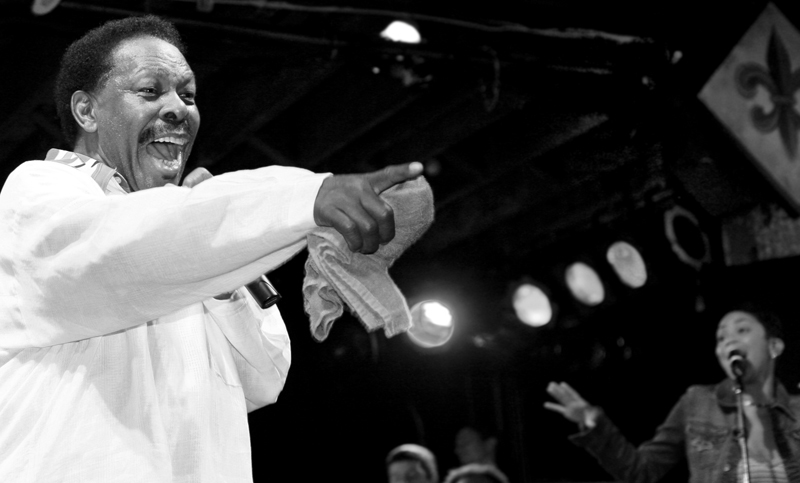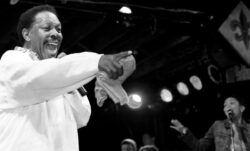Lloyd Price
Lloyd Price was a New Orleans rhythm-and-blues singer, songwriter, producer, and music industry executive who forged a uniquely colorful and successful career spanning seven decades.

Courtesy of Gary LoVerde
Lloyd Price performing at Tipitina's in 2007. LoVerde, Gary (Photographer)
Lloyd Price was a New Orleans rhythm-and-blues singer, songwriter, producer, and music industry executive who forged a colorful and successful career. His early career in the 1950s and 1960s included sixteen hit records, including three—“Lawdy Miss Clawdy,” “Stagger Lee,” and “Personality”—that have been rerecorded and/or licensed for commercial use more than six hundred times.
In the 1970s Price worked with boxing promoter Don King to produce music events related to two major professional boxing events: the 1974 Muhammad Ali–George Foreman heavyweight boxing title match known as the “Rumble in the Jungle,” staged in Kinshasa, Zaire (now the Democratic Republic of the Congo); and the 1975 Muhammad Ali–George Frazier heavyweight boxing title match dubbed “The Thrilla in Manila,” staged in Quezon City, Philippines. Beginning in the 1980s, Price focused on business pursuits. As a real estate developer, he saw to the construction of 160 units of single-residence and multi-family housing in the New York City boroughs of the Bronx and Staten Island. As an entrepreneur, Price established and promoted the Lawdy Miss Clawdy food brand, which included breakfast foods, entrées, snacks, and desserts. His remarkably varied achievements include work developing a Broadway musical based on his autobiography, intended to depict the rise of rhythm and blues and rock ’n’ roll, told strictly from the perspective of African American social and musical history.
Childhood
Born to working-class parents in the New Orleans suburb of Kenner on March 9, 1933, Lloyd Price came of age in the wake of the Great Depression, in a neighborhood of dirt roads and in a house with no electricity. He grew up as one of eleven children. “My Dad had a [hand-cranked] Graphonola he sometimes played on weekends,” Price remembered in his 2011 oral-history autobiography, The True King of the Fifties: The Lloyd Price Story. “I was seven years old, working for Mr. Joe on the ice truck. A load of ice weighed a minimum of 25 pounds per house. It was a lot to do before my school day would begin.” Always industrious, the young Price soon branched out into other sidelines, one involving a popular nightclub on the old Kenner Highway owned by Ike Cintani, whose family also owned a local grocery store. “It was divided into two sides,” Price recalled. “Our side was was called the ‘juke’ and the white people’s side was known as the saloon. On Monday mornings, Mr. Ike would let me clean up both sides, a lot of dirty sawdust with cigarette butts and cigars, for a quarter or sometimes he would give me two bits [two quarters].”
In the nightclub, the young Price was first exposed to the world of professional music-making. According to Price, the impact was immediate: “I never knew I could sing, but I always had the love of music and a feeling I could do it. … The first time I had ever seen or heard a jukebox was at Mr. Ike’s place. It played ten records and cost five cents. In 1942, when I was ten, a black recording artist named Louis Jordan was really burning up that jukebox. His song ‘Caledonia’ was really something. He was my hero. After that, I paid close attention to every song he put out. That’s where I got hooked on the music.” Later, the young entertainment-and-business prodigy would also absorb sounds of other seminal rhythm-and-blues artists, including Joe Liggins and the Honeydrippers, Roy Milton, and Amos Milburn.
Adolescent Years
When Price was an adolescent, his parents had established a small soul-food restaurant in Kenner called the Fish ’n’ Fry, which was run by his mother, Beatrice, to whom Price attributes much of his success in music and business. She strongly encouraged his musical pursuits and actively modeled lessons in business acumen. She had an old upright piano installed in her restaurant so her son could practice and perform. By then, the teenage musician had taught himself to play, formed a small band, and begun to write songs. Enamored with Okey Dokey Smith—the first radio disc jockey in New Orleans to incorporate African American jargon and phraseology—Price used his trademark phrase, “Well, lawdy, Miss Clawdy,” as the basis for an eight-bar blues set to a Louis Jordan–style shuffle rhythm.
In 1952 Los Angeles, California–based record company executive Art Rupe arrived at the Price family’s restaurant and heard their teenage son performing. Rupe thought “Lawdy Miss Clawdy” sounded like a rhythm-and-blues hit. Rupe engaged the services of producer–arranger Dave Bartholomew, pianist Fats Domino, and an A-list group of New Orleans backup musicians. They, along with Price, used the tiny but productive J&M Recording Studio to create a national hit that changed the course of popular music—both in New Orleans and nationally—while simultaneously breaking through racial barriers. “Its influence was tremendous,” author John Broven attested in his landmark book, Rhythm & Blues in New Orleans. “It seemed that every record made in New Orleans over the next 18 months or so was loosely based on that record.” Its national success was even more remarkable. “To my knowledge,” Rupe recalled to Broven, “it was the first black hit record that wasn’t intended to be a white record but became a white record, unlike previous black records that had been specifically designed for the white market. White kids began to buy this record, beginning in the South, oddly enough. I think because that’s where the cultures overlap. Musically, I think there was less prejudice in the South; politically, there was prejudice, but not musically.”
A Life and Career Committed to Social Transformation
After three more hit records, Price was drafted into the Army during the Korean War where he was assigned to a Special Services unit and put in charge of a large dance band for entertaining troops. He also continued to grow and evolve as a musician and backstage businessman. Price returned to civilian life with a new sound based on blending New Orleans traditions with those of a swing band. He then recorded twelve more hits. Among them, “Stagger Lee” was a version of a popular “outlaw” song and, when recorded in 1950 by the barrelhouse singer and pianist known as Archibald, was a minor hit in New Orleans. “Personality” was a thinly veiled reference to the Price’s own unflagging personal charisma.
Price also began forging a career on the business side of entertainment, publishing his own songs, running his own labels, and establishing a series of high-profile nightclubs in midtown Manhattan. But the shooting death of a close partner eventually derailed his enthusiasm, and, during the late 1960s, he went into self-imposed exile in Africa, living mainly in Nigeria and Ghana, where he became involved in local politics. Price returned to the United States in the early 1980s, launching career ventures in real estate, food business, and brand management, but staying away from performing until he accepted an invitation to tour with Jerry Lee Lewis, Little Richard, and Gary “U.S.” Bonds.
An inexhaustible fountain of energy and optimism, Price forged a remarkable life and career, with achievements across several seemingly unrelated fields. They were, however, all connected by his unyielding drive, powerful personality, and commitment to social transformation. Price influenced the sound and evolution of New Orleans rhythm and blues, as well as the sound of New Orleans music, which he helped translate to a mainstream, national market. In addition, his achievements contributed to the perception of international African American sporting events in the twentieth century; the construction of middle-class housing markets in densely populated urban neighborhoods; the possibilities of food-product lines marketed specifically to a national African American audience; and the link between accomplishment, reputation, and name-recognition as a marketing tool and catalyst for influencing large-scale business and social transformation. A devoted, lifelong bowling enthusiast, in 2009 Price received official US Bowling Council sanction for two product brands, the Lloyd Price Personality Pin-Buster and the Lawdy Miss Clawdy Voodoo Mama bowling balls. Furthermore, as a philanthropist, Price supported dozens of nonprofit organizations.
While his accomplishments are varied, his music is his most lasting legacy. In 1994 he received a Pioneer Award from the Rhythm and Blues Foundation, and in 1998 he was inducted into the Rock and Roll Hall of Fame as “one of the premier rhythm-and-blues singers of the 1950s and 1960” and as an accomplished “musician, bandleader, producer, record-company executive, and booking agent.” The Rock and Roll Hall of Fame described his earliest hit, “Lawdy Miss Clawdy,” as “a rhythm-and-blues classic that helped give birth to rock and roll.” In 2001 Price was also inducted into the freshman class of the National Black Sports and Entertainment Hall of Fame; based in Harlem, it included twelve members from sports and twelve from the world of entertainment, divided equally among prominent figures both past and living. Frank Sinatra once said of the irrepressible musician and entrepreneur, “Lloyd Price is the most-complete entertainer I have ever known.”
Lloyd Price died of complications from diabetes on May 3, 2021, in New Rochelle, New York. He was 88 years old.
